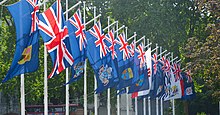
Back Britse oorsese gebiede Afrikaans Territorio Britanico d'Ultramar AN Bryttisc landbunes ANG أقاليم ما وراء البحار البريطانية Arabic اقاليم ما وراء البحار البريطانيه ARZ Territoriu Británicu d'Ultramar AST Böyük Britaniyanın dəniz əraziləri Azerbaijani بریتانیا خاریجی تورپاقلاری AZB Britische Ibaseegebiete BAR Брытанскія заморскія тэрыторыі Byelorussian

Before 1981 they were known as Crown colonies. The British Overseas Territories are also referred to as overseas territories of the United Kingdom,[1] UK overseas territories,[2] or when the context is clear, simply the Overseas Territories.[3]There are fourteen[3] territories under the United Kingdom's sovereignty.[4]
Each of the British Overseas Territories has a government, parliament, and prime minister to amend all laws, except laws about foreign affairs and defense. The British government manages its defense and foreign affairs. British Overseas Territories which have no local population or any population, have no local self-rule. If the British Overseas Territory is ruled badly, the government of the British Overseas Territory can be taken over by the British government and ruled directly by it, without the agreement of the British Overseas Territory.
The territories of Jersey, Guernsey , and the Isle of Man, though under the sovereignty of the British Crown, have a slightly different constitutional relationship with the United Kingdom, so they are classed as Crown dependencies rather than Overseas Territories. Unlike British Overseas Territories, the British government cannot take over the government of a Crown dependency, unless the government of the Crown dependency agrees. Territories and dependencies are distinct from the Commonwealth of Nations, a voluntary association of former British colonies which are independent countries.
In a historical context, colonies should be distinguished from protectorates and protected states, which though under British control, were nominally independent states, whereas colonies were part of the British state. They should also not be confused with Dominions, which, known collectively as the Commonwealth, were independent states, held to be equal in sovereign status to the United Kingdom within the Empire and Commonwealth after the Statute of Westminster in 1931. Crown colonies, such as Hong Kong, were differentiated from other colonies in being administered directly by the Crown, without the degree of local autonomy found in self-governed colonies and other British Overseas Territories such as Bermuda.
- ↑ "CIA - The World Factbook". Archived from the original on 2010-02-01. Retrieved 2007-08-05.
{{cite web}}: CS1 maint: bot: original URL status unknown (link) - ↑ "Foreign & Commonwealth Office Country Profiles". Archived from the original on 2003-07-31. Retrieved 2020-09-15.
- ↑ 3.0 3.1 "Foreign & Commonwealth Office". GOV.UK.
- ↑ The name "British Overseas Territory" was introduced by the British Overseas Territories Act 2002, and replaced the name British dependent territory which was introduced by the British Nationality Act 1981.